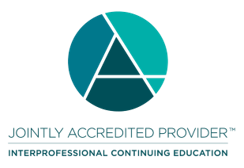Difficult Conversations: How to Communicate with Patients and Caregivers
Having good communication and listening skills when talking to patients and caregivers is essential, and yet many early career providers are uncomfortable having these conversations and lack real-world experience. Difficult conversations related to treatment options, hospice, and end-of-life care may be uncomfortable for both provider and patient, but they help patients understand their diagnosis and make informed decisions about their care. It is important for providers to understand that having these types of conversations, even if the patient is hesitant to have them, is a critical component of treating patients with cancer.
Target Audience
This program is designed to meet the educational needs of physicians, nurses, PAs, pharmacists, and other health care professionals who manage patients with cancer.
Learning Objectives
Following this program, participants should be able to:
- Explain the importance of having difficult conversations with patients and caregivers and how these types of conversations can impact patient care.
- Describe the differences between palliative, supportive and hospice care and how to communicate with patients and caregivers about them.
- Discuss resources that are available to patients and caregivers to help guide them in making difficult treatment decisions.
Kavitha Ramchandran, MD
Stanford Cancer Institute
NCCN Continuing Education Disclosure Policy
It is the policy of NCCN that all planners, faculty, moderators, authors, reviewers and anyone involved in the planning and delivery of NCCN continuing education activities are expected to disclose ALL financial relationships they have had in the past 24 months with ineligible companies. The ACCME Standards for Integrity and Independence require that individuals who refuse to provide this information will be disqualified from involvement in the planning and implementation of accredited continuing education presented by NCCN. NCCN identifies, mitigates and discloses to learners all relevant financial relationships.
In addition, all content has been reviewed to ensure education promotes safe, effective patient care and does not promote the products or services of an ineligible company. Content, including any presentation of therapeutic options, is fair, balanced, evidence-based, scientifically accurate, and free of commercial bias and marketing.
Definitions
Ineligible Company: An ineligible company is any entity whose primary business is producing, marketing, selling, re-selling, or distributing healthcare products used by or on patients.
Relevant Financial Relationships: Financial relationships of any dollar amount occurring within the past 24 months are defined as relevant if the educational content an individual can control is related to the business lines or products of an ineligible company. There is no minimum financial threshold. We ask for disclosure of ALL financial relationships with ineligible companies, regardless of the amount and regardless of the potential relevance of each relationship to the education.
Faculty Disclaimers
All faculty for this continuing education activity are competent in the subject matter and qualified by experience, training, and/or preparation for the tasks and methods of delivery.
Faculty presentations may include discussion of off-label use. Faculty will disclose that the use in question is not currently approved by the FDA per the product labeling or marketing.
Faculty, Moderator, and Planner Disclosures
The faculty listed below have no relevant financial relationship(s) with ineligible companies to disclose.
Karen Costello, MSS, LSW, OSW-C
Deborah Freedman-Cass
Karen Kanefield
Wui-Jin Koh, MD
Kavitha Ramchandran, MD
Carey Ramirez, ANP-C, ACHPN
The faculty listed below have the following relevant financial relationship(s) with ineligible companies to disclose. All of the relevant financial relationships listed for these individuals have been mitigated.
Eucharia Borden, MSW, LCSW, OSW-C, FAOSW
BeiGene: Honoraria
Wenora Johnson
Flatiron Health, Inc.: Consulting Fee
GSK: Honoraria
Xilio Therapeutics: Honoraria
Timothy Kubal, MD, MBA
Apellis Pharmaceuticals: Scientific Advisor
NCCN Staff Disclosures
The planners listed below have the following relevant financial relationship(s) with ineligible companies to disclose. All of the relevant financial relationships listed for these individuals have been mitigated.
Crystal Denlinger, MD, FACP
2seventy bio: Grant/Research Support
AbbVie, Inc.: Grant/Research Support
Bluebird bio: Grant/Research Support
Bristol Myers Squibb: Grant/Research Support
Eli Lilly and Company: Grant/Research Support
Genentech, Inc: Grant/Research Support
GSK: Grant/Research Support
Pfizer Inc: Grant/Research Support
sanofi-aventis U.S.: Grant/Research Support
None of the other planners for this educational activity have relevant financial relationship(s) to disclose with ineligible companies whose primary business is producing, marketing, selling, re-selling, or distributing healthcare products used by or on patients.

In support of improving patient care, National Comprehensive Cancer Network (NCCN) is jointly accredited by the Accreditation Council for Continuing Medical Education (ACCME), the Accreditation Council for Pharmacy Education (ACPE), and the American Nurses Credentialing Center (ANCC), to provide continuing education for the healthcare team.
Physicians
NCCN designates this enduring material for a maximum of 0.75 AMA PRA Category 1 Credit™. Physicians should claim only the credit commensurate with the extent of their participation in the activity.
Nurses
NCCN designates this educational activity for a maximum of 0.75 contact hour.
Pharmacists
NCCN designates this knowledge-based continuing education activity for 0.75 contact hour (0.075 CEUs) of continuing education credit. UAN: JA4008196-0000-24-082-H01-P
PAs
NCCN has been authorized by the American Academy of PAs (AAPA) to award AAPA Category 1 CME credit for activities planned in accordance with AAPA CME Criteria. This activity is designated for 0.75 AAPA Category 1 CME credits. Approval is valid until March 1, 2025. PAs should only claim credit commensurate with the extent of their participation.
Available Credit
- 0.75 AAPA Category 1 CME credit
- 0.75 ACPE contact hours
- 0.75 AMA PRA Category 1 Credit™
- 0.75 ANCC contact hours
- 0.75 ASWB continuing education credit
- 0.75 Participation
Required Hardware/software
To complete this activity, users will need:
- A device with an Internet connection and sound playback capability
- One of the two latest versions of Google Chrome, Mozilla Firefox, or Safari
- Internet Explorer is no longer supported
- Adobe Reader or other PDF reader software for certificate viewing/printing

 Facebook
Facebook X
X LinkedIn
LinkedIn Forward
Forward